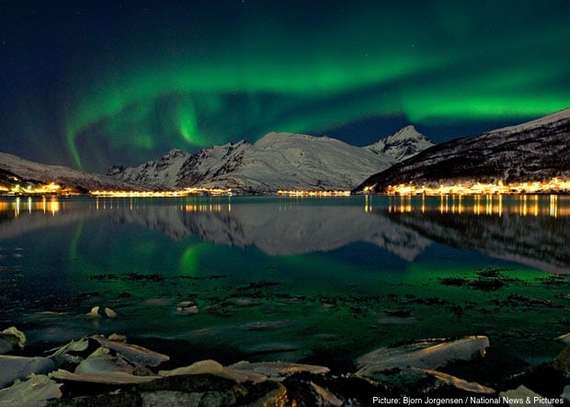Know how to clear a room of 500 international guests in the middle of dinner in less than 3 minutes? Announce that the Northern Lights can be seen outside.
The chance to see the aurora borealis up close and personal is one of many unique benefits of attending a conference in northern Norway at the end of January.
Taking place this week in Tromsø, Norway, at 70 degrees north, the conference in this case is Arctic Frontiers, THE international arena for discussing the future of sustainable development in the Arctic. The conference presents participants with the opportunity to not only see the Northern Lights but also to witness the first time the sun will rise above the horizon after a two month absence.
By combining discussions of policy, business, science, academia and culture above the Arctic Circle, Norway has created an annual forum for expanding interest and shared knowledge of the importance of the Arctic. Arctic Frontiers includes discussions and presentations from political leaders and Norwegian and international experts on ways to move toward ensuring a sustainable future for the Arctic.
The focus of this year's conference, "White Space -- Blue Future," is the oceans, a timely topic given the role the ocean plays in food provisioning, climate regulation, transportation and resource development.
Over the years, a number of side events have been added to the conference to offer the international Arctic community and participants cultural and networking opportunities. I hope such additions will help rally the interest of a new and younger generation with backgrounds in academia, business and politics.
For those students in the U.S. who cannot make it to Tromsø for the conference, I'm available to engage via Skype in a Virtual Ambassador session to discuss any number of topics, including the Arctic. If you're interested in participating, click here.
There are more than 2,000 participants at this year's conference, representing 35 countries. Many of these countries are not members of the Arctic Council, but rather observers. From a Norwegian perspective, it's encouraging that non-Arctic countries are present and eager to learn and engage. There are 32 observer countries and organizations to the Arctic Council and more are interested to get involved. Additionally, we are also witnessing an increase in scientific research from more countries than in the past. This is very good.
Beyond the conference, Norway is committed to strengthening multilateral cooperation in the Arctic through the Arctic Council. We are very appreciative of the U.S. chairmanship of the Arctic Council, which has accomplished a great deal. The agreement on strengthening international science cooperation in the Arctic is a landmark achievement. We look forward to continuing our close cooperation with the U.S. in the months leading up to the Arctic Ministerial.
As the Arctic Frontiers conference takes place, an important annual gathering for marine scientists, the Alaska Marine Science Symposium, is being held in Anchorage. This is critical, as the challenges we are facing in addressing the effects of climate change are larger than any one nation and should not be faced alone, and the symposium encourages multinational collaboration on this very important topic.
By focusing on the oceans, this year's Arctic Frontiers conference brings a particular charge, as climate change will, in a few decades, open up a new ocean. I believe that conferences such as this one can provide inspiration and energize our efforts in our day jobs as they relate to the Arctic, but we should not forget that the important thing is results.
Ultimately, the success of the Arctic Frontiers conference lies in its ability to bring people together to focus our collective resources together to develop solutions to joint challenges.

